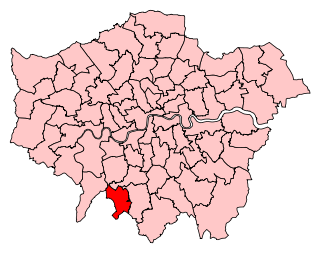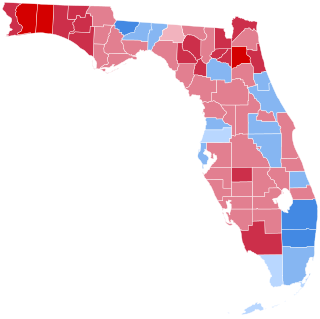
The single transferable vote (STV) or proportional-ranked choice voting (P-RCV), is a multi-winner electoral system in which each voter casts a single vote in the form of a ranked ballot. Voters have the option to rank candidates, and their vote may be transferred according to alternative preferences if their preferred candidate is eliminated or elected with surplus votes, so that their vote is used to elect someone they prefer over others in the running. STV aims to approach proportional representation based on votes cast in the district where it is used, so that each vote is worth about the same as another.

Since becoming independent of the United Kingdom in 1970, Fiji has had four constitutions, and the voting system has changed accordingly.

Elections to the European Parliament take place every five years by universal adult suffrage; with more than 400 million people eligible to vote, they are the second largest democratic elections in the world after India's.
Regular elections in Croatia are mandated by the Constitution and legislation enacted by Parliament. The presidency, Parliament, county prefects and assemblies, city and town mayors, and city and municipal councils are all elective offices. Since 1990, seven presidential elections have been held. During the same period, ten parliamentary elections were also held. In addition, there were nine nationwide local elections. Croatia has also held three elections to elect members of the European Parliament following its accession to the EU on 1 July 2013.

The single-chamber Parliament of Georgia has 150 members, elected for a four-year term through elections. The last presidential elections were held in October 2018 due to constitutional changes taking effect in 2024, after which the president will be elected for a five-year term by a parliamentary college of electors. The series of constitutional changes, initiated in 2017, stipulated a one-time transitional presidential term of six years for 2018–2024. Other major systemic changes included a move to a fully proportional system by 2024 with a 5% threshold.

Elections in Belgium are organised for legislative bodies only, and not for executive functions. Direct elections take place for the European Parliament, the Chamber of Representatives, the Parliaments of the Regions, the Parliaments of the Communities, the provincial councils, the municipal councils and the councils of Districts of Antwerp. Voting is mandatory in federal elections, and all elections use proportional representation which in general requires coalition governments.

Elections in Bhutan are conducted at national (Parliamentary) and local levels. Suffrage is universal for citizens 18 and over, and under applicable election laws. In national elections, also known as the general elections, political party participation is mainly restricted to the lower house of Parliament, and by extension, to the executive nominated by its majority
There are five types of elections in Slovakia: municipal elections, regional elections, parliamentary elections, presidential elections and elections to the European Parliament. All four types of elections are normally held after fixed periods, although early elections can occur in certain situations. Elections are conventionally scheduled for a Saturday - the polls normally open at 7:00 in the morning and close at 22:00 in the evening. Citizens aged 18 years or older are eligible to vote. Those serving prison sentences for particularly serious crimes, as well as those deprived of legal capacity, including persons with mental disabilities, are denied the right to vote. Voter registration is passive and decentralized with the voter register maintained by municipalities based on the permanent residence register. Voter lists are updated continuously based on municipal records and input provided by state institutions or other municipalities. Voters may verify their data in voter lists, and, if necessary, request correction until the day before election day. On election day, a voter can be added to a voter list upon presenting an identity card with proof of residency. Some 4.4 million voters are registered and valid to vote in the elections. Voters are only able to vote from abroad during the Parliamentary Elections in Slovakia.

Elections in Lithuania are held to select members of the parliament, the president, members of the municipal councils and mayors, as well as delegates to the European Parliament. Lithuanian citizens can also vote in mandatory or consultative referendums.

Since its establishment in 1947, Pakistan has had a non-symmetric federal government and is a federal parliamentary democratic republic. At the national level, the people of Pakistan elect a bicameral legislature, the Parliament of Pakistan. The parliament consists of a lower house called the National Assembly, which is elected directly via first-past-the-post voting, and an upper house called the Senate, whose members are chosen by elected provincial legislators. The head of government, the Prime Minister, is elected by the majority members of the National Assembly and the head of state, the President, is elected by the Electoral College, which consists of both houses of Parliament together with the four provincial assemblies. In addition to the national parliament and the provincial assemblies, Pakistan also has more than five thousand elected local governments.

Parliamentary elections were held in Kyrgyzstan on 27 February and 13 March 2005. The belief that the elections had been rigged by the government led to widespread protests, culminating in the Tulip Revolution on 24 March in which President Askar Akayev was overthrown.

Torfaen is a constituency in Wales represented in the House of Commons of the UK Parliament since 2015 by Nick Thomas-Symonds, a member of the Labour Party who also serves as the Paymaster General and Minister for the Cabinet Office under the government of Keir Starmer. It was established for the 1983 general election.

Sutton and Cheam is a constituency in Greater London represented in the House of Commons of the UK Parliament since 2024 by Luke Taylor, a Liberal Democrat.

The 2000 United States presidential election in Florida took place on November 7, 2000, as part of the nationwide presidential election. Florida, a swing state, had a major recount dispute that took center stage in the election. The outcome of the 2000 United States presidential election was not known for more than a month after balloting because of the extended process of counting and recounting Florida's presidential ballots. State results tallied on election night gave 246 electoral votes to Republican nominee Texas Governor George W. Bush and 255 to Democratic nominee Vice President Al Gore, with New Mexico (5), Oregon (7), and Florida (25) too close to call that evening. Gore won New Mexico and Oregon over the following few days, but the result in Florida was decisive, regardless of how those two states had voted.

General elections were held in Niue on 7 June, 2008. They were initially expected to be held in April, but were delayed until June 2008. Niue has a 20-member legislative assembly, called the Niue Assembly, whose members are elected by approximately 600 registered voters. The assembly consists of 20 total members, 6 elected on a common roll and 14 representatives of the villages

The Election Commission of Pakistan (ECP) is an independent, autonomous, permanent and constitutionally established federal body responsible for organizing and conducting elections to the national parliament, provincial legislatures, local governments, and the office of president of Pakistan, as well as the delimitation of constituencies and preparation of electoral rolls. As per the principles outlined in the Constitution of Pakistan, the Commission makes such arrangements as needed to ensure that the election is conducted honestly, justly, fairly and in accordance with law, and guard against corrupt practices. The Election Commission was formed on 23 March 1956.

The election of the president and the vice president of the United States is an indirect election in which citizens of the United States who are registered to vote in one of the fifty U.S. states or in Washington, D.C., cast ballots not directly for those offices, but instead for members of the Electoral College. These electors then cast direct votes, known as electoral votes, for president, and for vice president. The candidate who receives an absolute majority of electoral votes is then elected to that office. If no candidate receives an absolute majority of the votes for president, the House of Representatives elects the president; likewise if no one receives an absolute majority of the votes for vice president, then the Senate elects the vice president.

There are five types of elections in the United Kingdom: elections to the House of Commons of the United Kingdom, elections to devolved parliaments and assemblies, local elections, mayoral elections, and police and crime commissioner elections. Within each of those categories, there may also be by-elections. Elections are held on Election Day, which is conventionally a Thursday, and under the provisions of the Dissolution and Calling of Parliament Act 2022 the timing of general elections can be held at the discretion of the prime minister during any five-year period. All other types of elections are held after fixed periods, though early elections to the devolved assemblies and parliaments can occur in certain situations. The five electoral systems used are: the single member plurality system (first-past-the-post), the multi-member plurality, the single transferable vote, the additional member system, and the supplementary vote.

The 2020 Ukrainian local elections took place on Sunday 25 October 2020. In the election, deputies of district councils and rural townships were elected and elections for city mayors were held. In practice this will mean that most voters had to fill out four ballots. On 15, 22 and 29 November and 6 December 2020 a second round of mayoral elections was held in cities with more than 75,000 voters where no candidate gained more than 50% of the votes.

Elections to Shetland Islands Council took place on 5 May 2022 on the same day as the 31 other Scottish local government elections. As with other Scottish council elections, it was held using single transferable vote (STV) – a form of proportional representation – in which multiple candidates are elected in each ward and voters rank candidates in order of preference.

















